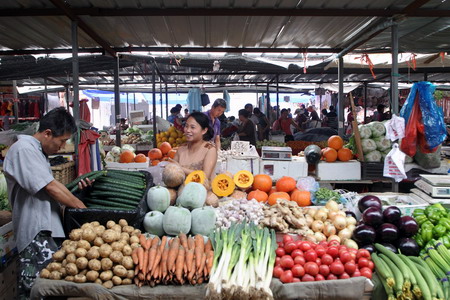Economy
China steps up subsidies for the needy
(China Daily)
Updated: 2011-06-27 15:02
 |
Large Medium Small |
|
 |
|
Like consumers everywhere, these shoppers at the Wangjing Gymnasium Park market in the capital face higher food prices. [Photo / China Daily] |
The National Development and Reform Commission (NDRC), the country's top economic planner, said on Friday that 18 provinces, autonomous regions and municipalities had set up the mechanism to give financial support to the needy in both urban and rural areas.
Another six provincial-level regions will implement the mechanism before the end of August, according to an NDRC statement.
The statement said the entire country will be covered by the end of this year.
The plan mainly covers the disabled, low-income residents and the unemployed.
In Tianjin, a monthly subsidy of 20 yuan ($3) is offered to the needy if the consumer price index (CPI), the main gauge of inflation, rises between 3-5 percent; if the CPI rises between 5-7 percent, the subsidy will rise to 30 yuan.
| ||||
"The mechanism seeks to ensure that the quality of people's lives are not reduced despite the rises in consumer prices," said an official with the NDRC, who spoke on the condition of anonymity.
China's CPI shot up 5.5 percent year-on-year in May, a 34-month high. The index rose 5 percent in the first quarter and 5.3 percent in April, well above the government's 4-percent target for the whole year.
Food prices, which account for nearly one-third of the basket of goods in the nation's CPI calculation, surged 11.7 percent in May from a year earlier. Higher prices are becoming increasingly difficult to afford, especially for the poor.
Gao Ying, of the residential committee of Tiantongyuan community in Beijing, said the committee receives a lot of complaints from local residents, especially the unemployed, about increasing food prices.
She said it would be of great help if the government provides some financial support to low-income people.
"The food price climbs so quickly yet the salary or subsidy doesn't look any better," said Gao. "The subsidy might ease their complaints to some extent."
For instance, prices of pork, the main meat consumed in the country, have increased 40.4 percent in May year-on-year. The lean pork price at a supermarket in Beijing was 41.2 yuan a kilogram on Saturday.
A resident surnamed Cui, who was laid off three years ago and is now living on unemployment insurance, said she would appreciate it if she could receive some financial assistance from the government.
But the subsidy standards adopted by Tianjin, which promises to give the needy 20 yuan or 30 yuan a month are too small, she said.
"Nowadays even 100 yuan hardly buys anything," she said. "Whether the mechanism works depend on how much is distributed."
China Daily - Xinhua
| 分享按钮 |



